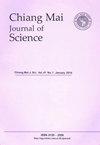Transcriptome Analysis of Early Pathogenetic Responsive Genes in Cavendish Bananas During Fusarium oxysporum f. sp. Cubense Race 1 and Race 4 Infection
IF 0.8
4区 综合性期刊
Q3 MULTIDISCIPLINARY SCIENCES
引用次数: 0
Abstract
Banana Fusarium wilt is a devastating banana disease caused by Fusarium oxysporum f. sp. cubense (Foc), seriously threatening the global banana industry. However, knowledge of the molecular mechanisms of pathogenicity and the interaction between the host and Foc is limited. In this study, we confi rmed the changes in gene expression and pathways in the Cavendish banana variety “Brazilian” during early infection with Foc1 and Foc4 by comparative transcriptomic analysis, including pathogenesisrelated protein genes, leucine-rich repeat type genes, and plant hormone genes. In the early stages of Foc inoculation, more differentially expressed genes were identifi ed in roots infected with Foc1 than in those infected with Foc4. According to Gene Ontology and Kyoto Encyclopedia of Genes and Genomes analyses, bananas with Foc1 infection caused differential accumulation and expression of various defence-related compounds and genes at the early stage of infection. In contrast, changes in the expression of defence-related genes in the early stages of Foc4 infection were small or weak and were not apparent until 24 h post-infection. Therefore, plant immune responses may occur at this stage of infection. This study could help clarify the interaction between banana plants and Foc and develop control measures for banana Fusarium wilt.卡文迪什香蕉1、4种感染尖孢镰刀菌早期发病应答基因的转录组分析
香蕉枯萎病是由香蕉尖孢镰刀菌(Fusarium oxysporum f. sp. cubense, Foc)引起的一种破坏性香蕉病害,严重威胁着全球香蕉产业。然而,对致病性的分子机制和宿主与Foc之间的相互作用的了解有限。在这项研究中,我们通过比较转录组学分析,证实了卡文迪什香蕉品种“巴西”在感染Foc1和Foc4的早期基因表达和通路的变化,包括致病相关蛋白基因、富含亮氨酸的重复型基因和植物激素基因。在接种Foc的早期阶段,感染Foc1的根中发现的差异表达基因多于感染Foc4的根。根据基因本体和京都基因与基因组百科全书分析,感染Foc1的香蕉在感染早期引起了各种防御相关化合物和基因的差异积累和表达。相比之下,防御相关基因在Foc4感染早期的表达变化较小或较弱,直到感染后24 h才明显。因此,植物免疫反应可能发生在感染的这个阶段。本研究有助于阐明香蕉植株与Foc的相互作用,制定香蕉枯萎病的防治措施。
本文章由计算机程序翻译,如有差异,请以英文原文为准。
求助全文
约1分钟内获得全文
求助全文
来源期刊

Chiang Mai Journal of Science
MULTIDISCIPLINARY SCIENCES-
CiteScore
1.00
自引率
25.00%
发文量
103
审稿时长
3 months
期刊介绍:
The Chiang Mai Journal of Science is an international English language peer-reviewed journal which is published in open access electronic format 6 times a year in January, March, May, July, September and November by the Faculty of Science, Chiang Mai University. Manuscripts in most areas of science are welcomed except in areas such as agriculture, engineering and medical science which are outside the scope of the Journal. Currently, we focus on manuscripts in biology, chemistry, physics, materials science and environmental science. Papers in mathematics statistics and computer science are also included but should be of an applied nature rather than purely theoretical. Manuscripts describing experiments on humans or animals are required to provide proof that all experiments have been carried out according to the ethical regulations of the respective institutional and/or governmental authorities and this should be clearly stated in the manuscript itself. The Editor reserves the right to reject manuscripts that fail to do so.
 求助内容:
求助内容: 应助结果提醒方式:
应助结果提醒方式:


